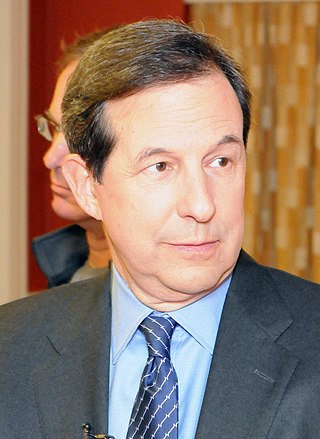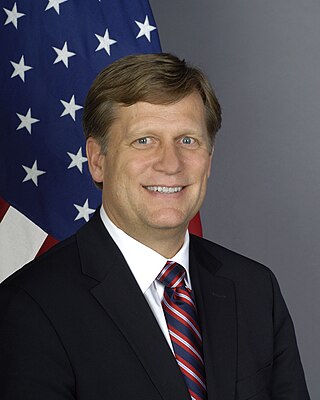
The Commission on Presidential Debates (CPD) is a nonprofit corporation established in 1987 under the joint sponsorship of the Democratic and Republican political parties in the United States. The CPD sponsors and produces debates for U.S. presidential and vice-presidential candidates and undertakes research and educational activities relating to the debates. Between 1988 and 2020, the CPD organized all general election presidential debates.

Christopher Wallace is an American broadcast journalist. He is known for his tough and wide-ranging interviews, for which he is often compared to his father, 60 Minutes journalist Mike Wallace. Over his 50-year career in journalism he has been a correspondent, moderator, or anchor on CBS, ABC, NBC, Fox News, and now CNN. In 2018 he was ranked one of America's most trusted TV news anchors. Wallace has won three Emmy Awards, a Peabody Award, a George Polk Award, the duPont-Columbia University Silver Baton Award, and a Paul White lifetime achievement award.

Russia and the United States maintain one of the most important, critical and strategic foreign relations in the world. Both nations have shared interests in nuclear safety and security, nonproliferation, counterterrorism, and space exploration. Due to the Russian invasion of Ukraine, relations became very tense after the United States imposed sanctions against Russia. Russia placed the United States on a list of "unfriendly countries", along with South Korea, Taiwan, European Union members, NATO members, Switzerland, Australia, New Zealand, Singapore, Micronesia, Japan and Ukraine.

Michael Anthony McFaul is an American academic and diplomat who served as the United States ambassador to Russia from 2012 to 2014. McFaul became the Ken Olivier and Angela Nomellini Professor in International Studies in the Department of Political Science at Stanford University in 1995, where he is the Director of the Freeman Spogli Institute for International Studies. He is also a Peter and Helen Bing Senior Fellow at the Hoover Institution. He is also a contributing columnist at The Washington Post. Prior to his nomination to the ambassadorial position, McFaul worked for the U.S. National Security Council as Special Assistant to the President and senior director of Russian and Eurasian affairs, where he was the architect of U.S. President Barack Obama's Russian reset policy.

Jacob Jeremiah Sullivan is an American attorney who is serving as the United States National Security Advisor, reporting directly to President Joe Biden. He previously served as Director of Policy to President Barack Obama, National Security Advisor to then Vice President Biden and Deputy Chief of Staff to Secretary Hillary Clinton at the U.S. Department of State. Sullivan also served as senior advisor to the U.S. federal government at the Iran nuclear negotiations and senior policy advisor to Clinton's 2016 presidential campaign, as well as visiting professor at Yale Law School. On November 23, 2020, President-elect Biden announced that Sullivan would be appointed the United States National Security Advisor. He took office on January 20, 2021.

The 2020 United States presidential election was the 59th quadrennial presidential election, held on Tuesday, November 3, 2020. The Democratic ticket of former vice president Joe Biden and the junior U.S. senator from California Kamala Harris defeated the incumbent Republican president, Donald Trump, and vice president, Mike Pence. The election took place against the backdrop of the global COVID-19 pandemic and related recession. The election saw the highest voter turnout by percentage since 1900, with each of the two main tickets receiving more than 74 million votes, surpassing Barack Obama's record of 69.5 million votes from 2008. Biden received more than 81 million votes, the most votes ever cast for a candidate in a U.S. presidential election.

On April 25, 2019, former vice president Joe Biden released a video announcing his candidacy in the 2020 Democratic Party presidential primaries. On November 3, 2020, Biden and his running mate, Kamala Harris, defeated incumbent Republican president Donald Trump and vice president Mike Pence in the general election.

The 2018 Russia–United States summit was a summit meeting between United States President Donald Trump and Russian President Vladimir Putin on July 16, 2018, in Helsinki, Finland. The Finnish Ministry for Foreign Affairs officially titled the summit as the #HELSINKI2018 Meeting and it was hosted by the President of Finland Sauli Niinistö.

Volodymyr Oleksandrovych Zelenskyy is a Ukrainian politician and former entertainer who has been serving as the sixth president of Ukraine since 2019, including during the full-scale Russian invasion of Ukraine ongoing since 2022.

The 2024 United States presidential election will be the 60th quadrennial presidential election, set to be held on Tuesday, November 5, 2024. Voters in each state and the District of Columbia will choose a slate of electors to the U.S. Electoral College, who will then elect a president and vice president for a term of four years.
The 2020 United States presidential debates between Joe Biden and Donald Trump, the major candidates in the 2020 United States presidential election, were sponsored by the Commission on Presidential Debates. There were three initially planned scheduled debates. The first debate took place on September 29, 2020. The next debate was scheduled to take place on October 15 but was later canceled due to Trump's COVID-19 diagnosis and refusal to appear remotely rather than in person. As a result, 2020 had the fewest debates since 1996. The final debate took place on October 22. Additionally, a debate between the vice presidential candidates Mike Pence and Kamala Harris took place on October 7.
This is a timeline of major events leading up to, during, and after the 2024 United States presidential election. This will be the first presidential election to be run with population data from the 2020 census. In addition to the dates mandated by the relevant federal laws such as those in the U.S. Constitution and the Electoral Count Act, several milestones have consistently been observed since the adoption of the conclusions of the 1971 McGovern–Fraser Commission.
The Biden–Ukraine conspiracy theory is a series of false allegations that Joe Biden, while he was vice president of the United States, improperly withheld a loan guarantee and took a bribe to pressure Ukraine into firing prosecutor general Viktor Shokin to prevent a corruption investigation of Ukrainian gas company Burisma and to protect his son, Hunter Biden, who was on the Burisma board. As part of efforts by Donald Trump and his campaign in the Trump–Ukraine scandal, which led to Trump's first impeachment, these falsehoods were spread in an attempt to damage Joe Biden's reputation and chances during the 2020 presidential campaign, and later in an effort to impeach him.

Donald Trump, the 45th president of the United States, who served from 2017 to 2021, announced his campaign for a nonconsecutive second presidential term in the 2024 U.S. presidential election on November 15, 2022. He was officially nominated on July 15, 2024 at the Republican National Convention in Milwaukee, and accepting his nomination to the presidency of the United States for the GOP during the final day of the convention on July 18, 2024, where was announced J. D. Vance, the junior U.S. Senator from Ohio, as the nominee for vice president and campaign partner. If elected into office, Trump will become the oldest president in American history and the second to serve a second non consecutive term after Grover Cleveland.
The foreign policy of the Joe Biden administration emphasizes the repair of the United States' alliances, which Biden argues were damaged during the Trump administration. The administration's goal is to restore the United States to a "position of trusted leadership" among global democracies in order to address challenges posed by Russia and China. Both Biden and his Secretary of Defense Lloyd Austin have repeatedly emphasized that no other world power should be able to surpass the United States, either militarily or economically. Biden's foreign policy has been described as having ideological underpinnings in mid-twentieth century liberal internationalism, American exceptionalism, and pragmatism.

Joe Biden, the 46th and current president of the United States, announced his candidacy for re-election for a second presidential term on April 25, 2023, with Vice President Kamala Harris as his running mate. He withdrew from the campaign on July 21, 2024.

The 2024 United States presidential election in Utah is scheduled to take place on Tuesday, November 5, 2024, as part of the 2024 United States elections in which all 50 states plus the District of Columbia will participate. Utah voters will choose electors to represent them in the Electoral College via a popular vote. The state of Utah has six electoral votes in the Electoral College, following reapportionment due to the 2020 United States census in which the state neither gained nor lost a seat.
The 2024 United States presidential debates are a series of debates between major candidates of the 2024 United States presidential election. The first general election debate, sponsored by CNN, was attended by former presumptive Democratic nominee Joe Biden and then-presumptive Republican nominee Donald Trump and was held on June 27, 2024. The second debate, which will be sponsored by ABC, is scheduled to be held on September 10, 2024.
In July 2024, Prime Minister of Hungary Viktor Orbán announced undergoing several uncoordinated meetings that he referred to as "peace missions", visiting President of Ukraine Volodymyr Zelenskyy in Kyiv before traveling to Moscow to meet with President of Russia Vladimir Putin, followed with him visiting Beijing to meet with Xi Jinping, then traveling to the United States to attend the 2024 Washington summit and to meet Donald Trump at Mar-a-Lago. The meetings notably took place amidst heightened tensions and ongoing conflict in Ukraine following Russia's invasion in 2022, with China increasing diplomatic ties to Russia in the midst of economic sanctions by the European Union and the United States. The visit to Russia was notable in geopolitical history for being conducted without any official approval or mandate from European Union governance despite Vladimir Putin claiming that Orbán was a representative of the European Union. This led to condemnation from several EU national leaders and Ukraine's government, calling the meetings "appeasement" towards Russia's aggressive, expansionist policies in Ukraine and China's partnership with Russia allowing their military to continue the way despite Western sanctions. It also caused concern among European Union leaders that Orbán was attempting to co-opt his position in the presidency of the Council of the European Union and speak on its behalf to achieve personal goals at odds with the policies and values of the bloc.

At 81 years, 8 months and 2 days of age, Joe Biden, the 46th president of the United States, is the oldest sitting president in United States history. Republican president Donald Trump and mass media raised concerns about his age, including his cognitive state, during and after the 2020 United States presidential election. These concerns increased after a poor performance by Biden during a debate against Trump in the 2024 presidential election, which led a number of commentators and some Democratic lawmakers to call for Biden to drop out of the 2024 presidential race. He later withdrew his candidacy.
















